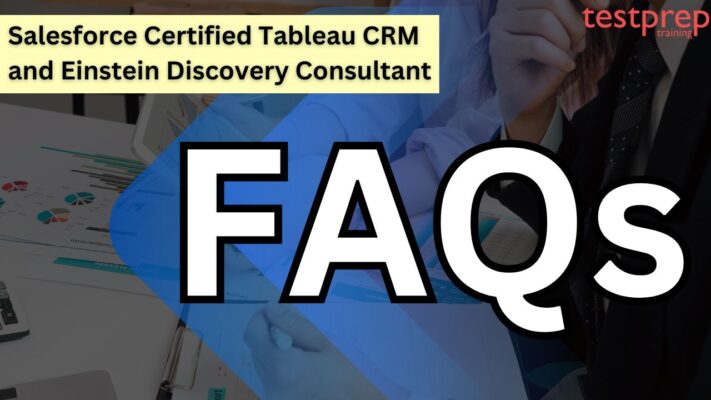Salesforce Certified Tableau CRM and Einstein Discovery Consultant
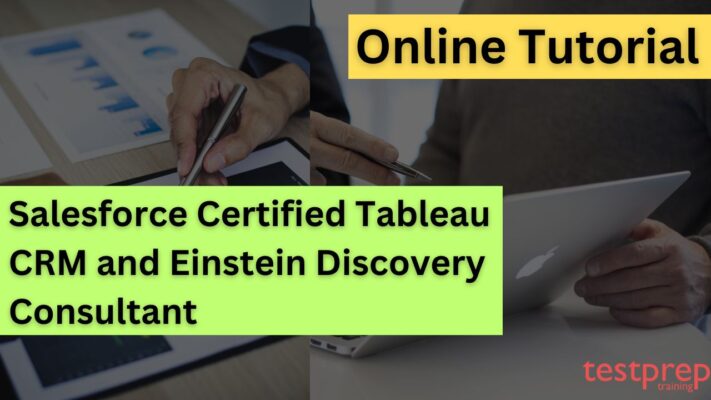
The Salesforce Certified Tableau CRM and Einstein Discovery Consultant certification is meant for those who are well-versed in data ingestion processes, implementing security and access, and creating dashboards. This credential covers the essential knowledge and skills needed to design, develop, and assist with apps, datasets, dashboards, and stories in Tableau CRM and Einstein Discovery.
Target Audience:
The Salesforce Certified Tableau CRM and Einstein Discovery Consultant exam is for someone with extensive knowledge of the Tableau CRM and Einstein Discovery platform. This includes skills in dataset management, implementing permissions and security, and advanced coding using Salesforce Analytics Query Language (SAQL) for querying and JSON for creating dashboards on both desktop and mobile devices.
Typically, a Salesforce Certified Tableau CRM and Einstein Discovery Consultant have at least one year of experience and skills covering various aspects of Tableau CRM and Einstein Discovery domains, such as:
FRONT END
- Choose the appropriate charts to meet business requirements.
- Develop meaningful and relevant dashboards by applying UX design principles and Tableau CRM best practices.
- Construct lenses powered by SAQL.
- Assess the need for dashboard binding/interaction (selection or result).
- Establish data source connections within the user interface.
- Create and customize template apps.
- Build dynamic calculations using compare tables.
- Enhance dashboard performance.
- Embed pages in dashboards.
- Adapt dashboard layouts for mobile.
ADMINISTRATIVE/MIDDLE
- Utilize user provisioning for identity and access management.
- Handle migration from lower environment change sets and API.
- Configure and manage integration with a source control system.
- Implement governance for dashboards and datasets to oversee Tableau CRM.
- Use security predicates and sharing inheritance for datasets.
- Manage App permissions.
- Apply encryption to a dataset.
- Explain the uses of the Tableau CRM API.
BACK END
- Load data into Tableau CRM, including CSV uploads and defining connectors for multi-org and native Salesforce data loading.
- Create dataset recipes.
- Enable and utilize data sync (replication) for independent data extracts.
- Understand the impact of enabling data sync.
- Manage and work around recipe and data sync limits.
- Implement role hierarchy.
- Add derived fields to a dataset.
EINSTEIN DISCOVERY
- Export data to Discovery.
- Prepare data for Discovery.
- Analyze story statistics and algorithms to make recommendations.
- Showcase Discovery insights on standard Salesforce pages.
What skills do you need?
The candidate for the Salesforce Certified Tableau CRM and Einstein Discovery Consultant possesses the following experience, skills, and knowledge:
- Certification or experience with other business intelligence (BI), extract-transform-load (ETL), Tableau CRM, and reporting tools.
- Understanding of dashboard/user experience (UX) design and aesthetics for both mobile and desktop.
- Proficiency in reading and writing Salesforce Analytics Query Language (SAQL) and Salesforce Object Query Language (SOQL).
- Proficiency in developing ETL processes for dataset preparation and management.
- Understanding of Master Data Management (MDM).
- Proficiency in developing stories in Einstein Discovery.
- Working knowledge of the data science life cycle.
- Working knowledge of statistical analysis.
- Working knowledge of data modeling.
- Experience in leading technical projects.
- Proficiency in administering, configuring, and securing Tableau CRM.
- Optional experience in administration, configuration, and securing Salesforce.
- Configure and perform writeback to Salesforce for Discovery models.
Exam Details
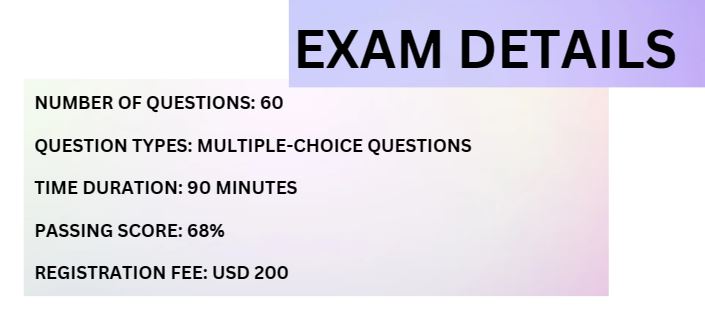
- The exam consists of 60 multiple-choice questions, and you have 90 minutes to complete it.
- To pass, you need a score of at least 68%. The registration fee is USD 200, plus applicable taxes as required by local law.
- If you need to retake the exam, the fee is USD 100, also subject to applicable taxes.
- You can choose to take the exam at a testing center with onsite proctoring or in an online proctored environment.
Registering for the Exam
Here’s how to register for the Salesforce Accredited B2B Commerce Administrator:
- Log in to Webassessor at www.webassessor.com/salesforce. If you don’t have a test taker profile, create one.
- Click on “Register for an Exam.”
- Find the exam you want and choose the delivery method: onsite proctored or online proctored. Click “Register.”
- For onsite proctored exam:
- Pick a testing center.
- Choose the date and time, read the policies, and acknowledge.
- For online proctored exams:
- Choose the date and time, read the policies, and acknowledge.
- Online exams adjust to your time zone from your Webassessor profile.
- Click “Select.”
- Review details, then click “Checkout.”
- Enter your payment info, including any voucher/coupon codes and/or credit card details. Taxes apply per local laws.
- Click “Submit.”
- You’ll get a purchase confirmation. Click “Done.”
- An email confirming your registration and purchase will be sent to you.
Course Outline
The exam for Salesforce Tableau CRM and Einstein Discovery Consultant exam assesses how well a person understands and can apply certain skills. To succeed, candidates need to be knowledgeable and skilled in each of the following areas.
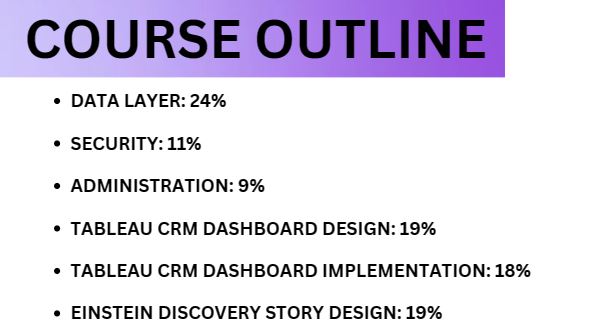
Data Layer: 24%
- Given data sources, use Data Manager to extract and load the data into the Tableau CRM application to create datasets. Describe how the Salesforce platform features map to the Model-View-Controller (MVC) pattern.
- Given business needs and consolidated data, implement refreshes, data sync (replication), and/or recipes to appropriately solve the basic business need. Identify the common scenarios for extending an application’s capabilities using the AppExchange.
- Given a situation, demonstrate knowledge of what can be accomplished with the Tableau CRM API
- Given a scenario, use Tableau CRM to design a solution that accommodates recipe limits.
Security: 11%
- Given governance and Tableau CRM asset security requirements, implement necessary security settings including users, groups, and profiles.
- Given row-based security requirements and security predicates, implement the appropriate dataset security settings.
- Implement App sharing based on user, role, and group requirements.
Administration: 9%
- Using change management strategies, manage migration from sandbox to production orgs.
- Given user requirements or ease-of-use strategies, manage dataset extended metadata (XMD) by affecting labels, values, and colors.
- Given a scenario, improve dashboard performance by restructuring the dataset and/or data using lenses, pages, and filters.
- Given business and access requirements, enable Tableau CRM, options, and access as expected.
Tableau CRM Dashboard Design: 19%
- Given a customer situation, determine and define their dashboarding needs.
- Given customer requirements, create meaningful and relevant dashboards through the application of user experience (UX) design principles and Tableau CRM best practices.
- Given business requirements, customize existing Tableau CRM template apps to meet the business needs.
Tableau CRM Dashboard Implementation: 18%
- Given business requirements, define lens visualizations such as charts to use and dimensions and measures to display.
- Given customer business requirements, develop selection and results bindings/interactions with static queries.
- Given business expectations, create a regression time series.
- Given customer requirements, develop dynamic calculations using compare tables.
- Given business requirements that are beyond the standard user interface (UI), use Salesforce Analytics Query Language (SAQL) to build lenses, configure joins, or connect data sources.
Einstein Discovery Story Design: 19%
- Given a dataset, use Einstein Discovery to prepare data for story output by accessing data and adjusting outputs.
- Given initial customer expectations, analyze the story results and determine suggested improvements that can be presented to the customer.
- Given derived results and insights, adjust data parameters, add/remove data, and improve story as needed.
- Understand models in production and enable prediction features across Salesforce CRM and Tableau CRM
Salesforce Certified Tableau CRM and Einstein Discovery Consultant Exam FAQs
Salesforce Certified Tableau CRM and Einstein Discovery Consultant Exam Study Guide
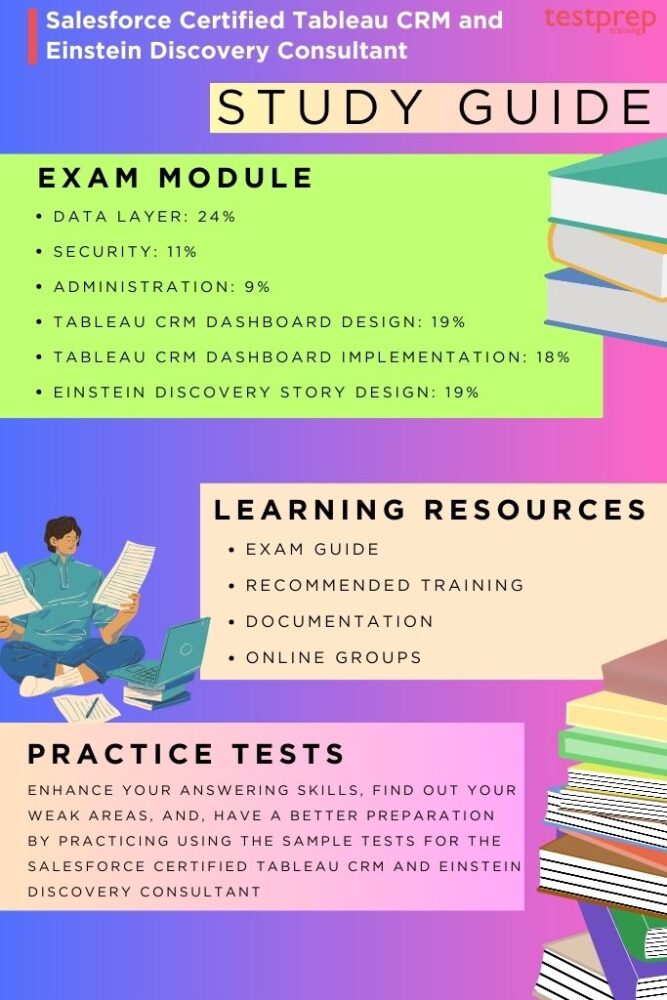
1. Understand Exam Guide
This exam guide is here to assist you in figuring out if you’re prepared to ace the Salesforce Certified Tableau CRM and Einstein Discovery Consultant exam. It includes details about who the certification is meant for, suggested training and documents, and a full list of exam goals—all aimed at helping you pass. To increase your chances of success, Salesforce strongly suggests a mix of hands-on experience, attending courses, and self-study.
2. Exam Objectives
Carefully reviewing the exam objectives is crucial to avoid missing important points. As mentioned earlier, going through the course outline thoroughly is essential for exam preparation, making sure you cover all necessary topics. Becoming familiar with the exam objectives multiple times not only helps you understand concepts faster but also boosts your confidence.
Therefore, revising is a key step often underestimated in exam preparation, playing a crucial role in strengthening your knowledge and readiness. Regular revision keeps the information fresh in your mind, increasing your chances of success on exam day. It serves as a valuable practice to reinforce your understanding and identify any areas that may need extra focus.
- Data Layer: 24%
- Security: 11%
- Administration: 9%
- Tableau CRM Dashboard Design: 19%
- Tableau CRM Dashboard Implementation: 18%
- Einstein Discovery Story Design: 19%
3. Recommended training
Salesforce suggests hands-on experience, completing training courses, exploring Trailhead trails, and engaging in self-study in the topics specified in the Exam Outline section of this exam guide. The self-study materials recommended for this exam include:
- Trailmix: Learn Tableau CRM Plus
Trailhead Trails:
- Explore with Tableau CRM
- Gain Insight with Einstein Discovery
- Tableau CRM Apps Basics
- Build and Administer Tableau CRM
- Accelerate Tableau CRM with Apps
Trailhead Superbadge:
The courses recommended for this exam include:
- Building Lenses, Dashboards, and Apps in CRM Analytics (ANC201)
- Implement and Manage CRM Analytics (ANC301)
Learning Guide:
Reference Documentation:
- Data Layer
- Security
- Admin
- Tableau CRM Dashboard Design
- Tableau CRM Dashboard Implementation:
- Explore and Visualize Your Data in Tableau CRM
- Build Tableau CRM Dashboards
- Progressive Disclosure (Loading)
- Embed and Customize Tableau CRM
- Tableau CRM Bindings Developer Guide
- Tableau CRM REST Query Resource
- Tableau CRM SAQL Reference
- Timeseries SAQL Statement
- Tableau CRM Extended Metadata (XMD) Reference
- Run Your Dashboards Faster with the Dashboard Inspector
- Einstein Discovery Story Design
4. Study Groups
Joining an Online Community, like the Salesforce Trailhead Community, is an excellent method to assess your position in the field. It provides a platform to connect with colleagues and stay informed. Exploring posts, questions, answers, and comments regarding real-world Wi-Fi situations offers valuable insights. The diverse perspectives contribute to livelier content, enriching your understanding. Moreover, these groups keep you updated on any exam changes, boosting your confidence in your preparation.
5. Use Practice Tests
Once you finish your preparation, it’s time to enter the performance phase, also referred to as self-evaluation. This step is crucial for recognizing your strengths and weaknesses, boosting confidence, and enhancing time management skills. Practice exams are designed to mimic the actual exam conditions, providing candidates with a realistic experience.
They allow you to gauge your readiness and make any necessary adjustments to ensure success on the actual exam day. It’s a valuable opportunity to refine your skills and build confidence in tackling the challenges that may arise during the real exam. Regular self-assessment is a key component in achieving optimal performance and ensuring a smooth exam experience.


